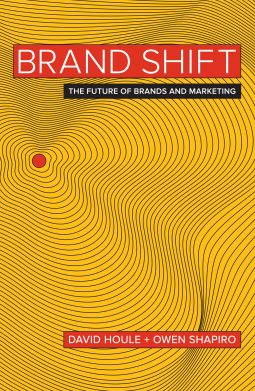
Brand Shift
The Future of Brands and Marketing
by David Houle & Owen Shapiro
This title was previously available on NetGalley and is now archived.
Send NetGalley books directly to your Kindle or Kindle app
1
To read on a Kindle or Kindle app, please add kindle@netgalley.com as an approved email address to receive files in your Amazon account. Click here for step-by-step instructions.
2
Also find your Kindle email address within your Amazon account, and enter it here.
Pub Date Sep 01 2014 | Archive Date Jan 28 2015
Description
However, each successive wave of technological change is getting shorter and shorter. The most recent wave of changes – social media and mobile technology – are expected to only last 5 to 10 years, meaning they will be eclipsed sometime between 2015 and 2020. For brands to successful adapt to this new environment, they need to first recognize these changing realities…and fast.
Brand Shift: The Future of Brands and Marketing delivers a powerful and persuasive look at how cultural change and accelerating technological advancement will affect brands and marketing in the years ahead. Through a fascinating study of the history of brands and a detailed, cogent analysis of current trends, the authors unveil a compelling forecast of how brand marketers will need to meet the novel demands of branding in the 21st century.
A Note From the Publisher
Author is available for interviews, blog tours, autographed book giveaways, contests, and book club discussions.
Advance Praise
“There are many books on how to build brands in the 20th century. This is the first to show what it will take to build successful brands in the 21st century.”
-Philip Kotler, S. C. Johnson & Son Distinguished Professor of International Marketing Kellogg School of Management, Northwestern University
“I loved “Brand Shift”! It provides an insightful look into the future of how brands will be marketed. Houle and Shapiro address the trends and challenges marketing professionals will face in the future and offer clear concepts and strategies to ensure that CMOs can succeed in the years ahead. I finally have a clearer view of where to go!” -Ann Rhoades, President People Ink, Founding Executive Jet Blue and Former Executive, Southwest Airlines
“By offering a thorough understanding of the history of brands and how technology, artificial intelligence, and Big Data will influence marketing trends, Houle and Shapiro deliver a compelling strategy for navigating the inevitable global shifts already challenging marketing professionals.” -Scott Meadow, Professor of Entrepreneurship at University of Chicago Booth School of Business
“I’ve known David Houle since he was part of our team at MTV as we re-invented how brands connected to consumers in that era. Today, as media continues to evolve and brands are seeking to effectively connect with consumers wherever they are, on multiple platforms and devices, Houle and his co-author Shapiro are helping marketers understand how to make those connections now.” -Robert Pittman, Chairman and CEO of Clear Channel Communications
Marketing Plan
DAVID HOULE is a futurist, thinker, and speaker and spent more than 20 years in media and entertainment. In addition to his work at NBC and CBS, he was part of the senior executive team that created and launched MTV, Nickelodeon, VH1, and CNN Headline News. Houle has received a number of awards including two Emmys, the prestigious George Foster Peabody award, and the Heartland award for “Hank Aaron: Chasing the Dream.” He was also nominated for an Academy Award. He is the Futurist in Residence at the Ringling College of Art + Design.
Houle has delivered some 600 speeches on six continents and twelve countries. He is often called “the CEOs’ Futurist” having spoken to or advised 2,500+ CEOs and business owners in the past seven years. Brand Shift is his sixth book.
OWEN SHAPIRO has always been fascinated with how people ‘make up their minds,’ which has lead him to pursue a diverse range of research and discovery projects both in academics and in business. Shapiro is a market researcher, strategist and speaker and spent more than 30 years in customer insights and market strategy. He has a career-long interest in helping launch innovative start-up companies, several of which have become well-known brands, including Staples, PetSmart, Sports Authority, Ulta and Five Below, and some that are just starting their journeys.
Shapiro is a guest presenter at the University of Chicago, where he received his MA and MBA – drawing on his combination of real-world experience with clients, his training in social science theory and his grounding in research methods.
Available Editions
| EDITION | Paperback |
| ISBN | 9780990563501 |
| PRICE | $14.99 (USD) |
Links
Average rating from 7 members
Featured Reviews
 David W, Media/Journalist
David W, Media/Journalist
Brand marketing is changing. Just when marketers thought they had figured it all out, along comes the future and everything is up for grabs again. What the future will bring is the subject of this fast read.
Of course, there is no “normal”. There has only ever been change. Brands only really blossomed in the last century. That society will look different tomorrow had better not be a shock to any marketer. Along the trip through change, the authors tease us with interesting concepts: planned obsolescence will be replaced by instant obsolescence. But nothing to demonstrate that.
They make much of social marketing taking the power out of marketers’ hands. But of course individuals are not actually running anything. They are pawns and drones, doing as the brandmastrers command, signing up for news, promotions, contests and giveaways, dragging their contacts into the morass for the chance to obtain some product for “free”, and sharing their “relationships” with brands among their contacts. But there is no hair pulling by the marketing department; they are in complete control of the so-called individual, who spreads their message far deeper than simple tv and print ads ever could. No charge.
There is also an inherent, unresolved, nay, undiscussed conflict in Brand Shift, that of Big Data vs. Social Media. On the one hand the authors extol the virtues of overwhelming data to give critical, unprecedented and mammoth backup to marketers, and woe betide the CMO who is not expert in manipulating it for better return on investment. It is mandatory to keep ahead. At the same time, they decry to anarchy of the web, where trolls lurk, false testimony is rampant, consumers publicly resent the manipulation, defamatory videos go viral and marketers have no “control” of the content. So which is it then? Are marketers gaining, or losing?
A lot of what the authors see coming is the Neurosphere, a sort of splinter on the road to The Singularity. In this concept, people congregate virtually to share expertise and don’t have to remember or master every little thing themselves. The Neurosphere will guide them, and validate their brand choices. Something along those lines will almost certainly evolve, but so might any number of other scenarios. For example, there might (finally) be an actual backlash against international brands for all their abuse of private information, poisoning our bodies and our ecosphere, and lying to us and about us. This might benefit local brands, or nonbrands. The Aldi chain offers completely unknown brands (basically store brands) you never heard of and which are never marketed, at stunningly low prices, and is rapidly succeeding all over the western world. Organic unbranded local farms suddenly account for 8% of production, up from a rounding error a decade ago. The future of international brands might still be secure, but it will be different and maybe shockingly so.
There are plenty of other possible scenarios to consider, but not for elucidation here, over a book 121 pages long, that admits to being a very high level survey. Suffice it to say the Neurosphere is an interesting scenario, and that marketers need to employ big data to its fullest potential.
David Wineberg
Readers who liked this book also liked:
Dominic Pettman
Health, Mind & Body, Nonfiction (Adult), Politics & Current Affairs
John Kotter; Holger Rathgeber
Business, Leadership, Finance, Nonfiction (Adult)









